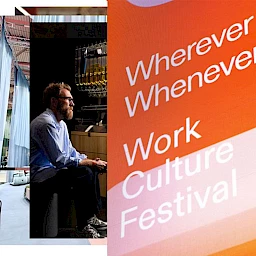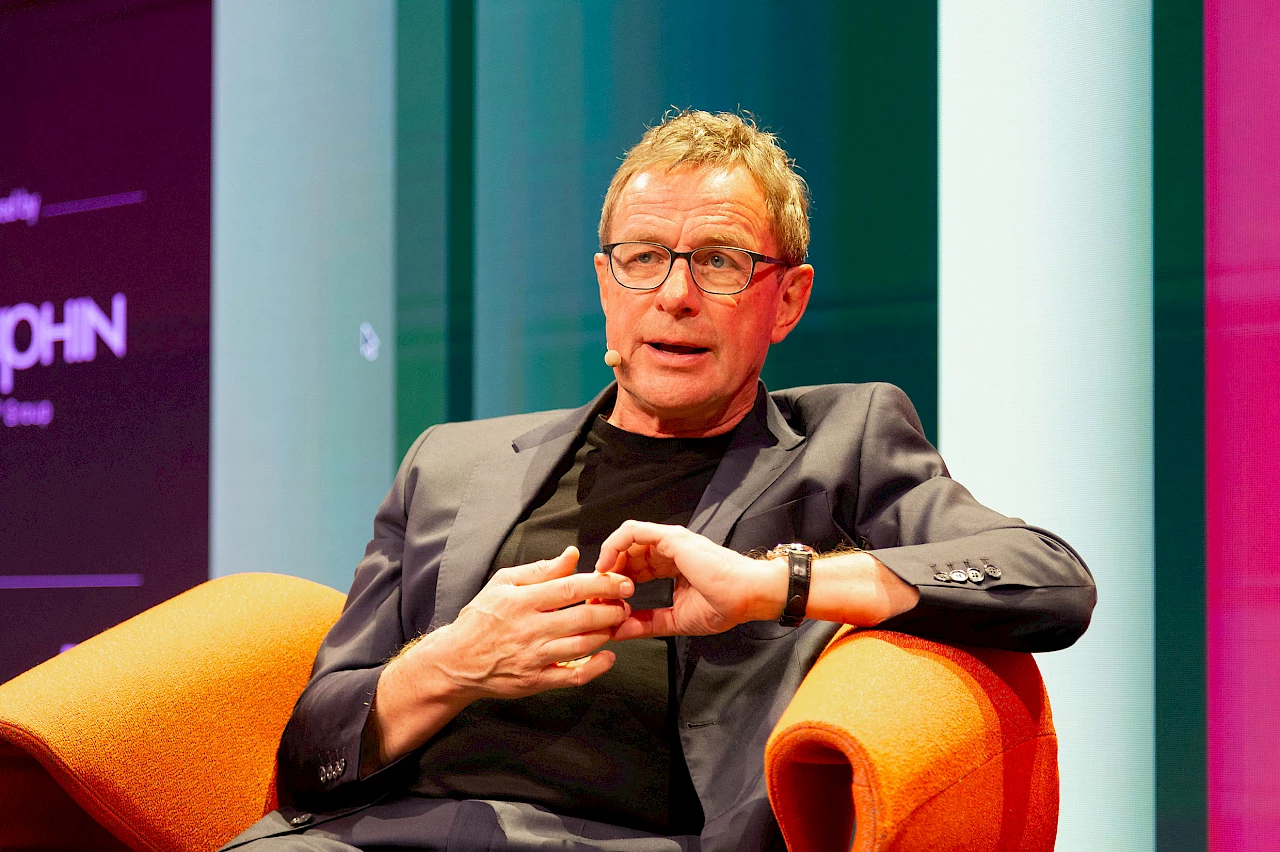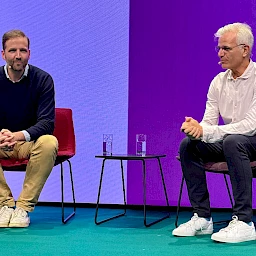At ORGATEC, Ralf Rangnick, one of Europe’s most renowned football coaches, spoke with Thorsten Giersch, editor-in-chief of DUP, about his views on leadership, responsibility and teamwork. Rangnick’s experience from top-level sport offers some parallels to the world of work and shows how teams can be successfully managed and developed. Here’s an overview.
Leadership focuses on people
“The biggest motivator is not money, but an environment in which I can develop, in which I can get better,” explained Rangnick. “Do I have an environment, do I have bosses who make me better, who enable me to become the best version of myself?” This approach has been a recurring theme throughout his career — from coaching a third division club to his successes with RB Leipzig and the Austrian national team. For Rangnick, leadership means creating the best conditions for individual and collective growth, because the development of individual players is only possible through the development of the team, according to Rangnick. For him, the focus is on people. He sees himself and his coaching staff as “development workers” who take care of everything and create an environment in which employees can develop and take on responsibility. What applies to football also applies to the world of work: Create conditions that enable people to discover and utilize their strengths.
Corporate identity and playing philosophy
Rangnick emphasized the importance of a clear corporate identity — in football as well as in companies. “Without corporate identity, there is no corporate behaviour,” says Rangnick. In football, this is reflected in a clear playing philosophy that shapes the players’ behaviour on the pitch. Companies also need to develop a clear identity, need to “know how they want to play” in order to provide orientation and guide their actions. An example from Rangnick’s time at Hoffenheim shows how consistently Rangnick pursues this principle: Thanks to clear structures and innovative approaches — such as the introduction of nutrition and mental coaches — a small regional club became a Bundesliga side. This success was based not only on talent but also on a clear vision of how football should be played. And the influence of a coach is much greater than is assumed in some places, according to Rangnick.
Leading through trust and responsibility
Rangnick compares the role of the coach to that of a conductor. Both need to understand exactly how a team plays together and at the same time promote individual talents. “They don’t care how much you know until they know how much you care,” says Rangnick. Applied to the world of work this means: Employees want to feel valued, recognized and that their superiors are interested in their development. In this context, Rangnick emphasized the importance of trust. Managers should give their employees the freedom to take responsibility and make their own decisions. “Good bosses let good people work,” he emphasized. “They must be able to contribute their own ideas and qualities.” This attitude not only promotes personal initiative, but also binds employees to the company.
Working conditions as a basis for success
In addition to the leadership philosophy, another success factor for Rangnick is having a well thought-out working environment. During his time at Hoffenheim, he ensured that the club not only had state-of-the-art training facilities, but also personal retreat spaces where players could relax between training sessions. Rangnick describes himself as an “improver” whose job it is to offer his players and coaching staff the best possible working conditions. “It’s about creating the best conditions so that the players can develop their full potential,” he explained. Investment in infrastructure was a key part of the recipe for success that transformed Hoffenheim from a third division club into an established Bundesliga team. But working conditions are not only crucial in sport. In companies too, the environment plays a key role in motivating employees and maintaining their performance. Rangnick emphasized that this does not always involve large investments. It is often small, well thought-out measures that make a big difference. A well-designed workplace, flexibility and state-of-the-art technical equipment can significantly increase employee commitment. “When people feel that their needs are being taken into account, they are not only happier, but also more productive,” says Rangnick. And he went even further. Not everyone works equally well under the same conditions. That is why it is important to give employees the opportunity to shape their working environment according to their individual needs, to pick out the right pieces of the puzzle from the organizational options.
Success and development: performance culture, error culture and a focus on the future
At ORGATEC, Rangnick emphasized that the relationship between short-term success and long-term development must be balanced. In football, as in the world of work, managers are faced with the task of achieving immediate results and at the same time creating a sustainable basis for future success. “Success can be planned,” explained Rangnick, emphasizing the need for discipline, a clear vision and the willingness to accept setbacks in order to grow in the long term. Performance culture plays a decisive role in this. Rangnick explained that continuous improvement is the key to top performance. “If we as a football team manage to regularly create more scoring chances than our opponents, we usually win the games,” he said. This principle can be applied directly to the world of work: Leadership that sets clear goals and provides the necessary resources motivates teams to exploit their full potential. It is not about control, but about support and inspiration that encourages employees to surpass themselves. Another important aspect is dealing with mistakes. Mistakes are unavoidable — in sport as well as in business. The decisive factor is how managers and teams react to this. Rangnick advocated a constructive error culture that aims to learn from setbacks and continuously improve. This requires courage, openness and clear communication. An honest and appreciative feedback culture helps teams to grow from mistakes and achieve better results in the long term.
Summary: Rangnick’s views on leadership are universal and provide valuable inspiration for the world of work. Whether on the pitch or in the office: Creating a supportive environment, setting clear goals and focusing on respect and cooperation lays the foundation for long-term success.
Work Culture Festival Impressions

Ralf Rangnick is a well-known German football coach, official and former football player. Rangnick is known for his innovative tactical approaches and his ability to lead teams from the lower leagues into the top division. He led TSG 1899 Hoffenheim from the regional league to the Bundesliga in just two seasons and won the German Cup with FC Schalke 04 in 2011. Rangnick worked at RB Leipzig from 2012 to 2019, first as sport director and then as head coach in the 2015/16 and 2018/19 seasons. At the same time, he was sport director at FC Red Bull Salzburg from 2012 to 2015. Rangnick has been coaching the Austrian national team since June 2022 and confidently led the team to qualify for the 2024 European Championship. His tactical concept, which relies on maximum pressing and quick transitions, made the Austria team an insider tip. In his presentations and talks, Rangnick emphasizes the importance of leadership, teamwork and taking responsibility. His leadership philosophy is based on consistent decisions and a holistic approach.
Cover photo: © IBA






